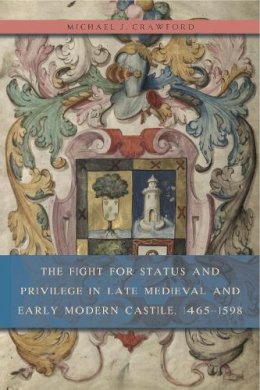Michael J. Crawford is Associate Professor of History at McNeese State University.
“Based on meticulous archival research, Crawford’s book reveals the complicated and fluid reality of ‘how Castilians actually experienced legal inequality in the early modern world.’ . . . [T]his is a book that a wide variety of historians will find an invaluable support to understanding the context of their own work.” —Grace E. Coolidge American Historical Review “Crawford’s book is a worthy successor to the research of his mentor, Helen Nader. Much more than a simple study concerning the struggle to preserve or quash hidalguia among all sorts of Spanish families of the fifteenth and sixteenth centuries, this book points to an early modern Iberian society seeking to find a replacement for its fast-fading medieval past.” —Donald J. Kagay Sixteenth Century Journal “Crawford’s careful and thorough research makes an important contribution to our understanding of the fluidity and ambiguity of noble status in early modern Castile.” —Jodi Campbell English Historical Review “What did it mean to be an hidalgo? This was a important status in late medieval and early modern Spain, one that all historians know was crucial—but none have really known much about it until now. Michael Crawford argues that hidalguía had little to do with the two main justifications that contemporary Spaniards gave for the privilege: that it either derived from a racial understanding of inherited nobility or was a reward for service to the king. Instead, noble status was fluid, contingent on circumstance, political networking, and the ability to carry out lengthy lawsuits successfully. Using hitherto unexploited sources, Crawford’s subtle analysis displays the rich complexity of local government in early modern Spain, pulling attention away from the so-called absolutism of the central government and showing how much more important the officials, regulations, and courts of local municipalities were in the real lives of Spaniards.” —Scott K. Taylor, University of Kentucky “Michael Crawford’s insightful monograph, The Fight for Status and Privilege in Late Medieval and Early Modern Castile, 1465–1598, offers the most engaging and carefully researched account of the widespread social pressure to reach noble status in late medieval and early modern Spain. Vividly describing the mechanisms to accomplish such aims, he uses the process of ennoblement, and resistance to it, as a lens through which to explore Spanish society. Focusing on Seville, Crawford provides his readers with a clear and compelling portrait of the manner in which conversos, foreigners, and others (most often newcomers to Seville) litigated with municipal authorities as they sought to confirm their status as hidalgos or petty noblemen. This was not an idle aspiration, since hidalgo status led to tax exemptions and privileges. This is an excellent book that clearly portrays the almost obsessive desire to achieve noble rank in early modern Spain, as well as the municipalities’ often failed efforts to protect their tax base. This is an important and first-rate contribution to our knowledge of the social and legal aspects of this conflict and, thus, to our understanding of one of the most critical issues in the history of early modern Spain.” —Teofilo F. Ruiz, UCLA

